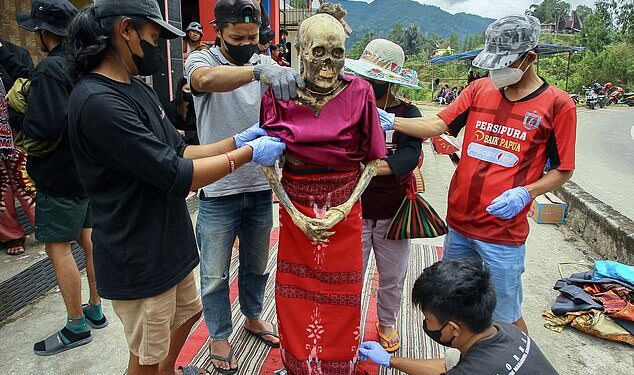- The Toraja people exhume their loved ones and take care of their bodies
- Their coffins are cleaned, and they are given fresh clothes
- The ceremony takes places roughly every four years
Mummified ancestors of a rural Indonesia tribe have been exhumed, spruced up and put on display as part of an intricate burial ritual.
Every four years, the Toraja people, who live across in South Sulawesi in the centre of the archipelago, dig up the graves of their ancestors to meticulously look after their bodies.
In a ceremony known as Ma’nene, which translates to ‘care of ancestors’ or ‘the cleaning of the corpse’, the bodies are exhumed, cleaned up, dried under the sun to ensure their longevity, and redressed in their new clothing,
Video footage from Liang Lo’ko’ Kuku, a small town where Toraja people live, showed them crowding aroun stone graves and traditional Toraja tombs and digging their coffins out of the ground.
Villagers were seen posing with their dead ancestors, who had dry, paper-like skin after spending years in the ground.

Mummified ancestors of a rural Indonesia tribe have been exhumed, spruced up and put on display as part of an intricate burial ritual

Every four years, the Toraja people dig up the graves of their ancestors to meticulously look after their bodies

The bodies are dug up, cleaned up, dried under the sun to ensure their longevity, and redressed in their new clothing
One man was seen patting the head of a dead man who was so well-preserved that his hair was still visible.
Villagers were then seen putting their relatives’ bodies back in their coffins with fresh modern clothes.
While many were seen wearing traditional sarongs, a long lengths of fabric favoured across south and south-east Asia, many were also seen wearing modern sunglasses and belts.
The ceremony takes places in Torajan villages across the region throughout the whole month of August.
According to HeritageDaily, the Toraja people don’t see death as a singular event, but rather the soul’s gradual passing to the afterlife.

A member of the Toraja ethnic group opens his relatives’ grave during the traditional ritual known as Manene in Pangala, South Sulawesi, on August 27, 2024

The ceremony takes places in Torajan villages across the region throughout the whole month of August

Villagers were seen posing with their dead ancestors, who had dry, paper-like skin after spending years in the ground

A member of the Toraja ethnic group holds the exhumed body of her baby who died in 1988, during the traditional ritual known as Manene in Pangala, South Sulawesi, on August 27, 2024
As a result, they believe the bodies of recently deceased people still need to be taken care of.
According to the New York Times, locals believe the ceremony began with a local hunter named Pong Rumasek, who lived hundred of years ago, though the authenticity of this myth is considered questionable at best.
He is said to have found an abandoned corpse in the jungle. Moved by the fate of the stranger, he took care of the dead body and dressed it up with his clothes.
From then on, Pong was said to have been blessed with good luck and bountiful hunts and harvests.






